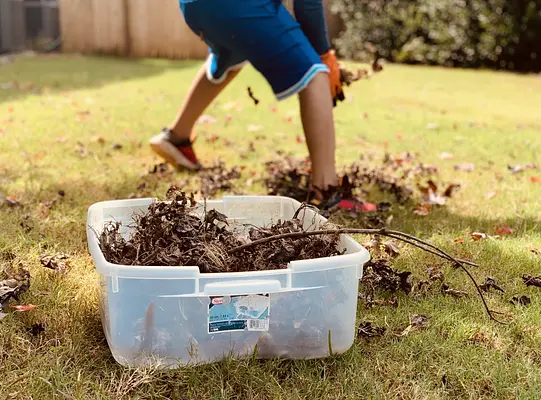There's something magical about watching your child discover the joy of working in the yard. Whether it's the pride in their eyes when they help plant their first flower or the giggles that erupt when they're "helping" rake leaves (and jumping in the pile afterward), outdoor chores can become some of your family's most treasured moments.
But let's be honest—getting kids involved in yard work can feel overwhelming. What's safe for a 4-year-old versus a 14-year-old? How do you keep them engaged without creating more work for yourself? I've been helping families navigate these questions for years, and I'm excited to share some tried-and-true strategies that will have your kids begging to help outside!
Why Yard Work is Perfect for Kids
Before we dive into age-specific tasks, let's talk about why outdoor chores are such a gift to our children. Yard work naturally teaches responsibility, patience, and the reward of hard work. Kids learn to care for living things, understand seasonal cycles, and develop a connection to nature that's increasingly rare in our digital world.
Plus, there's the physical benefit! In an age where screen time dominates, yard work gets kids moving, building strength, and developing coordination—all while breathing fresh air.
Ages 3-5: The Eager Little Helpers
At this age, enthusiasm far outweighs ability, and that's perfectly okay! The goal is to foster a love of helping while keeping safety as the top priority.
Safe Tasks for Preschoolers:
- Watering plants with a small watering can - They'll love the responsibility, and overwatering is rarely catastrophic with outdoor plants
- Picking up sticks and small debris - Turn it into a treasure hunt or counting game
- Spreading mulch with their hands - Sensory play meets productivity!
- Planting large seeds like sunflowers or beans in pre-dug holes
- Carrying lightweight tools in a special bucket or wagon
- "Helping" sweep patios with a child-sized broom
Safety Tips:
Always supervise closely and establish clear boundaries about which areas are off-limits. Invest in child-sized tools that are easier to handle and less likely to cause injury.
Ages 6-8: Building Real Skills
This age group can handle more complex tasks and follow multi-step instructions. They're developing fine motor skills and can work more independently (with supervision).
Perfect Tasks for Early Elementary:
- Weeding flower beds - Teach them to identify common weeds versus plants
- Raking leaves into piles - Great for building arm strength and coordination
- Washing outdoor furniture with a sponge and bucket
- Deadheading flowers - Improves the garden and teaches plant care
- Organizing garden tools in the shed or garage
- Sweeping walkways and patios thoroughly
- Planting seedlings and learning about proper spacing
Building Independence:
Create simple checklists with pictures so they can work through tasks independently. This builds confidence and ensures nothing gets forgotten.
Ages 9-12: The Capable Crew
Pre-teens can handle real responsibility and take pride in completing entire projects. They're ready for tasks that require planning and sustained effort.
Challenging Tasks for Tweens:
- Mowing small areas with a push mower (after proper training)
- Trimming bushes with child-safe pruning shears
- Planning and maintaining a small garden bed
- Washing cars or outdoor equipment
- Staining or painting fences (with appropriate brushes and supervision)
- Composting - managing the compost bin and understanding the process
- Seasonal cleanup like preparing garden beds for winter
Teaching Moments:
This is the perfect age to explain the "why" behind tasks. Help them understand how proper plant care leads to beautiful gardens, or how regular maintenance prevents bigger problems later.
Ages 13+: The Junior Landscapers
Teenagers can handle almost any yard work task and should be learning skills they'll use as adults. They can work with minimal supervision and take ownership of entire projects.
Advanced Responsibilities:
- Operating power tools (with proper training and safety gear)
- Planning seasonal yard maintenance schedules
- Installing simple landscaping features like garden borders or stepping stones
- Managing irrigation systems and troubleshooting problems
- Tree and shrub care including proper pruning techniques
- Lawn care including fertilizing, aerating, and overseeding
- Budget management for yard projects and supplies
Life Skills Focus:
At this age, emphasize how these skills translate to real-world value. Many teens can earn money doing yard work for neighbors, and these skills will serve them well as homeowners someday.
Universal Safety Guidelines
No matter the age, safety should always be your top priority:
- Start with proper clothing: Closed-toe shoes, long pants for certain tasks, and sun protection
- Tool safety: Teach proper handling, storage, and maintenance of all tools
- Weather awareness: Avoid working in extreme heat, storms, or when conditions are unsafe
- Hydration breaks: Especially important during summer months
- Clear communication: Establish signals for when help is needed or when it's time to stop
Making It Fun and Rewarding
The secret to successful kid involvement in yard work is making it enjoyable:
- Create themed projects: Butterfly gardens, pizza herb gardens, or fairy gardens
- Set up friendly competitions: Who can fill their bucket with weeds fastest?
- Document progress: Take before and after photos of projects
- Celebrate completion: Have a special snack or activity after big yard work sessions
- Connect to learning: Discuss plant biology, weather patterns, or environmental science
Seasonal Considerations
Spring: The Season of New Beginnings
Focus on planting, cleaning up winter debris, and preparing garden beds. Kids love seeing new growth and can learn about plant life cycles.
Summer: Maintenance Mode
Watering, weeding, and harvesting become the primary tasks. Early morning or evening work helps avoid the heat.
Fall: Preparation Time
Raking leaves, planting bulbs for next year, and preparing the yard for winter teach kids about planning ahead.
Winter: Planning and Indoor Prep
Depending on your climate, winter might mean planning next year's garden, maintaining tools, or continuing with evergreen care.
Building Long-Term Success
Remember, the goal isn't perfection—it's participation and learning. Some days will be more successful than others, and that's completely normal. Celebrate effort over results, and don't be afraid to adjust expectations based on your child's interest and energy level on any given day.
The habits and skills your children develop through yard work will serve them throughout their lives. You're not just maintaining your landscape; you're cultivating responsible, capable, and nature-connected future adults.
Keeping Everyone Organized and Motivated
Managing outdoor chores for multiple children can be challenging, especially when trying to track age-appropriate tasks, safety requirements, and fair compensation for their hard work. This is where having a good organizational system becomes invaluable.
Consider using Chore Boss, a free app designed specifically to help families manage, organize, and schedule chore tasks. With customizable chore assignments, in-app reminders, and a virtual piggy bank to track earnings, it makes coordinating yard work (and all household tasks) much simpler. The app helps teach kids responsibility and money management while keeping parents organized—turning the challenge of chore management into a rewarding family experience.
Happy gardening, and remember: the best yard work happens when the whole family is involved! What outdoor chore will your family tackle first?






